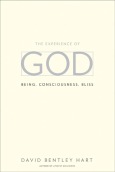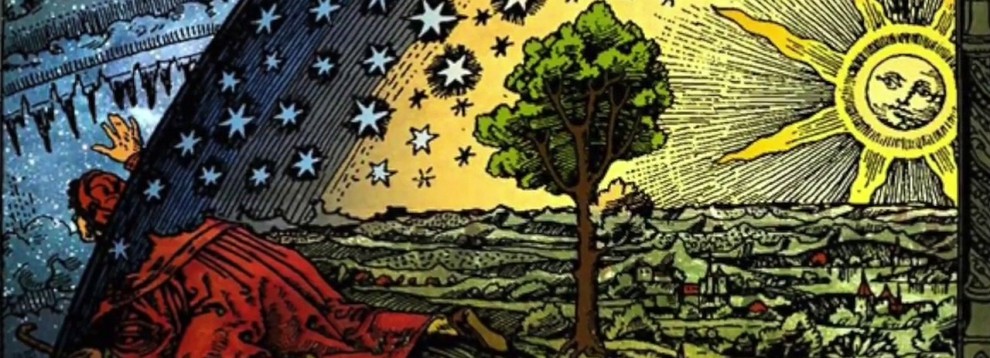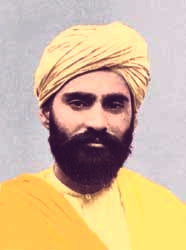Today we’ll talk about the funny word in the title. ‘Mono-polyt heism’ is a word used by David Bentley Hart in his rather heavy philosophical tome ‘the experience of God’, a book that tries to explain what the word ‘God’ God means in the monotheistic traditions . The word mono-polytheosm describes the idea that God is a being more like the gods of polytheism, but still the only one in his species. That’s the way in which I will use it anyway. (Hart also uses it more or less as a synonym for ‘theistic personalism’, but that’s a term and discussion that I feel no connection with at all and will leave for others. Philosophy, theoretical theology and a multitude of deep words can be very important one one hand to really say something meaningful about Reality, but on the other hand one can easily drift off to get lost in conceptual words too that have not much relevance, or even reality behind them in any way at all…)
heism’ is a word used by David Bentley Hart in his rather heavy philosophical tome ‘the experience of God’, a book that tries to explain what the word ‘God’ God means in the monotheistic traditions . The word mono-polytheosm describes the idea that God is a being more like the gods of polytheism, but still the only one in his species. That’s the way in which I will use it anyway. (Hart also uses it more or less as a synonym for ‘theistic personalism’, but that’s a term and discussion that I feel no connection with at all and will leave for others. Philosophy, theoretical theology and a multitude of deep words can be very important one one hand to really say something meaningful about Reality, but on the other hand one can easily drift off to get lost in conceptual words too that have not much relevance, or even reality behind them in any way at all…)
To start I offer a quote from Hart for a definition of the term:
“a view of God not conspicuously different from the polytheistic picture of the gods as merely very powerful discrete entities who possess a variety of distinct attributes that lesser entities also possess, if in smaller measure; it differs from polytheism, as far as I can tell, solely in that it posits the existence of only one such being. It is a way of thinking that suggest that God, since he is only a particular instantiation of various concepts and properties, is logically dependent on some more comprehensive reality embracing both him and other beings.” (DBH, the experience of God, p 127-128):
To be honest, Hart might always require slow reading and re-reading. One of my FB friends recently assured me that she needs a dictionary too when reading him, and unlike me she has English as her first language and is quite intelligent.
Back to Mono/polytheism. The main question is what I am talking about when I as a Christian and Monotheist use the word ‘God’. In a classical monotheist definition as used in Abrahamic faiths, and according to Hart also in other tradition like certain forms of philosophical Hinduism, this is something completely different from what is meant with the ‘gods’ in a polytheist fashion. Really ‘God’ has no plural and can’t have one either. God is the Creator, the Source and Ground of Being. The One, both transcendent an immanent in all of the multiverse. If the creation story is true in any way, as well as the rest of the bible, God is Universal (quite probably multiversal even, I’d add). Surely while I believe that Christians have special revelation of God in the person of Christ, other people have concepts of Him too. Not only the Abrahamic names of Yahweh, Allah but also the Manitou or Great Spirit of the original Americans, or the Hinduist Brahman or Ọlọ́run in Yoruba are ways to describe this Multiversal Creator. Yes, some things will differ, some pictures will be better than others, but there is One God behind all of existence. And all our talk of this Ultimate Reality is just primitive babytalk anyway, even in the most refined theological schools.
Some philosophers or theologians, for example in Christian Orthodoxy, go as far as saying that God does not ‘exist’ because His mode of being is completely different, as he is the Source of Being, and maybe even Existence and Being itself. But all of these words are just mere fingerscratches on the surface of something bigger than the sun…
The problem is that not all people define God in this way. In certain views, which are those I would see as ‘monopolytheism’ we do have a “God” that is not completely the source of all Being, and depending on other things, and subject to certain natural laws (or ‘higher magic’?) that maybe even preceded it and that it can’t go against. Which means that our “God” still has a Higher Reality to depend on and answer too somehow…
This certainly seems to be an existing picture of God that I sometimes encounter in several schools of theology, especially in certain schools of modernist ‘liberal’ theology, probably including process theology, but similar sentiments can be uttered by ‘conservative’ Christians too sometimes. It also seems related to -though probably incompatible with- a form of deism in which God made the laws of nature and afterwards isn’t able to break them even if He wanted. (The lengths some people go to combine abstract philosophic notions of God with cramped modernist assertions against miracles can be quite amusing…)  The problem is that we end up with something that is more like a demiurge than the Creator. (And if there’s a demiurge, maybe there’s a Higher God in the background that’s more important…)
The problem is that we end up with something that is more like a demiurge than the Creator. (And if there’s a demiurge, maybe there’s a Higher God in the background that’s more important…)
It’s also often the picture atheists paint of the “God” they reject. Well, no disagreement with them, since I reject it too, but that seems very hard to explain sometimes… It is this “God” too that is rejected in the simplistic ‘only atheists of one god more’ argument that sound not very logical if you really think about what God is and what Gods are.
(Sorry Brian McLaren,I once again go with David Bentley Hart here )
Let me also be clear here that I do not per se have to reject polytheism here, even if being a more than convinced monotheist. I actually happen to have no problem at all with the existence of the gods, but just want the clear that whatever they are, they are not God and not in the same league at all. If they exist they are powers of nature or higher beings inside the word, or maybe entities on (fallen) archangel-level, or in some cases even thoughtform-entities (Hey Fotamecus, did you beat old Chronos already?) or just anthropomorphic personifications of actually rather impersonal forces inside this world. (WATCH OUT WITH WHAT YOU SAY HERE, I KEEP MY EYES ON YOU!)
It might even be that in a soft polytheistic vein what is called ‘gods’ are only personifications of the One, the Divine, which is thus just a way to describe aspects of God. Certain schools of Hinduism and some African religions seem to think that way. If I understand Yoruba well the orishas might function in such a way for example.
Still I as a Christian believe that I have access to a much clearer view on and path to the Multiversal Creator, wich is found in Christ as the most fully revelation of God. Yes, the most scandalous claim of Christianity is not the trinity which mostly leads to more philosophical discussions, long words and misunderstanding of these words, but rather the Incarnation, the idea that in the person of a human Jesus the Creator stepped into His Creation and even shared in our suffering -well, got tortured to death eventually even-, and in partaking in death conquered death, sin and evil, But that’s another thing. Let’s note also that the Living Word (Logos) is something completely different from all our human formulations.
So like the title says, I don’t care for thing mono-polytheism (and even less for any form of monopoly-theism, in that matter). If God is not the Absolute, the One, the Creator it makes no sense being a monotheist at all. We end up with a conceptual demiurge at best, and a self-created illusion or even God-replacing egregore at worst… Conceptual idolatry is always a danger for those who want to define God instead of just letting God be God while acknowledging that no theology will  ever fully describe the One. (Except for the Living Word, Christ, but here we have the same problem that we need Christ to just be Christ, and not try to trap him in our formulations and description like a dried butterfly in a museum collection.)
ever fully describe the One. (Except for the Living Word, Christ, but here we have the same problem that we need Christ to just be Christ, and not try to trap him in our formulations and description like a dried butterfly in a museum collection.)
So for anyone who wants to discuss God and theology with me, please accept that the classical monotheist definition of God as the Creator of the universe (from which everything originates, including the regularities that we call ‘laws of nature’), not some being inside the universe bound by the ‘laws of nature’ is crucial for me. You can deny the existence of this God, but arguing about the existence of merely a one-of-its-kind god in this world is not something I want to defend and something I’m completely not interested in at all.
What do you think?
Peace
Bram
 On Easter the greatest mystery of the Christian religion is celebrated: the resurrection of Christ. Today I’m going to zoom in on the first witness of the Risen Jesus, who was a remarkable woman.
On Easter the greatest mystery of the Christian religion is celebrated: the resurrection of Christ. Today I’m going to zoom in on the first witness of the Risen Jesus, who was a remarkable woman.



